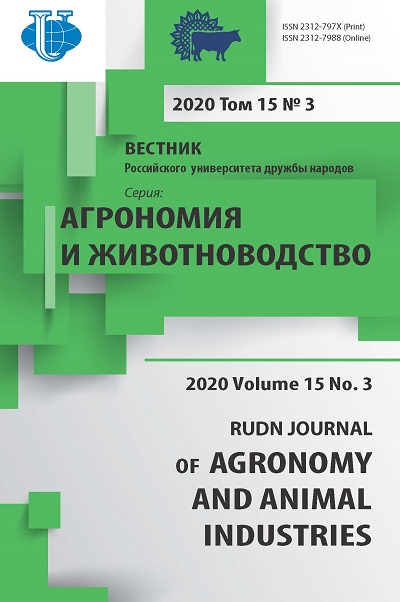Agroecological study of garden carrot cultivars from collection of Vavilov institute
- Authors: Zaitseva N.A.1, Tumanyan A.F.2, Seliverstova A.P.1
-
Affiliations:
- Precaspian Agrarian Federal Scientific Center of the Russian Academy of Sciences
- Peoples’ Friendship University of Russia
- Issue: Vol 15, No 3 (2020)
- Pages: 253-262
- Section: Crop production
- URL: https://agrojournal.rudn.ru/agronomy/article/view/19584
- DOI: https://doi.org/10.22363/2312-797X-2020-15-3-253-262
- ID: 19584
Cite item
Full Text
Abstract
Carrots are one of the most important root crops in the world. Due to such qualities as plasticity and relative non-wholesome cultivation, carrots are cultivated in most countries of the world. Carrot roots are a valuable source of vitamins A, B, B2, B6, B12, C, RR, E, R. Agroecological conditions of the region allow to cultivate carrots in the open ground. Astrakhan region is not yet characterized by high production rates, as its cultivation can be done only under irrigation. The article considers the influence of agroecological conditions on crop yield and adaptability of garden carrots cultivars in the arid zone of the Caspian region. Experiments on studying the carrots cultivars was carried out on the fields of Precaspian Agrarian Federal Scientific Center of the RAS in 2017-2019. The purpose of the research was to study garden carrots cultivars from collection of plant genetic resources of Vavilov Institute for the selection of high-productive and more adapted samples. The object of research was 17 types of carrots from the world Vavilov collection. Based on three-year studies on yield, we can distinguish the following cultivars: Berlanda F1 (Netherlands), Nantese (Italy) and Imperator Type 9-11 (USA) with yield of 68.4 to 75.2 t/ha. The coefficient adaptability was higher than 1, in the varieties Berlanda F1 (Netherlands), Nantese (Italy), F1 Eagle (Canada), Imperator Type 9-11 (USA), Wav-88 (Germany), Surazhevskaya-1 (Russia). They have ability to adapt to difficult growing conditions and produce consistently high yields. The samples selected can be used in the future to create new cultivars and hybrids for conditions of the Caspian region.
Keywords
About the authors
Nadezhda Aleksandrovna Zaitseva
Precaspian Agrarian Federal Scientific Center of the Russian Academy of Sciences
Author for correspondence.
Email: rexham@rambler.ru
Candidate of Agricultural Sciences, Head of the Breeding Laboratory
8 Severny kvartal st., Solenoe Zaymishche village, Chernoyarsky District, Astrakhan Region, 416251, Russian FederationAntonina Fedorovna Tumanyan
Peoples’ Friendship University of Russia
Email: aftum@mail.ru
Doctor of Agricultural Sciences, Professor, Agrobiotechnological Department, Agrarian and Technological Institute
8 Miklukho-Maklaya st., Moscow, 117198, Russian FederationAnastasiya Pavlovna Seliverstova
Precaspian Agrarian Federal Scientific Center of the Russian Academy of Sciences
Email: rexham@rambler.ru
Junior Researcher, Breeding Laboratory
8 Severny kvartal st., Solenoe Zaymishche village, Chernoyarsky District, Astrakhan Region, 416251, Russian FederationReferences
- Stolarczyk J, Janick J. Carrot: History and Iconography. Chronica horticulturae. 2011; 51(2):13—18.
- Zhuchenko AA. Adaptivnaya sistema selekcii rastenij (ekologo-geneticheskie osnovy) [Adaptive plant breeding system (ecological and genetic bases)]. Moscow: RUDN University Publ.; 2001. (In Russ).
- Dospekhov BA. Metodika polevogo opyta [Methodology of field experience]. 5th ed. Moscow: Agropromizdat Publ.; 1985. (In Russ).
- Metodika gosudarstvennogo sortoispytaniya sel’skohozyajstvennyh kul’tur [Methodology of state variety testing of agricultural crops]. Issue 2. Moscow: Kolos Publ.; 1989. (In Russ).
- Ushakov NM, Shuchkina VP, Timofeeva EG, Pilipenko VN. Priroda i istoriya Astrakhanskogo kraya [Nature and history of the Astrakhan region]. Astrakhan: AGU Publ.; 1996. (In Russ).
- Zvolinskij VP, Tyutyuma NV, Taranova ES. Proizvodstvo ovoshchebahchevyh kul’tur v usloviyah Astrahanskoj oblasti [Production of vegetable and berry crops in the Astrakhan region]. Volgograd: VGSKHA Publ.; 2011. (In Russ).
- Kiryushin VI. Agronomicheskoe pochvovedenie [Agronomic soil science]. Moscow: Kolos Publ.; 2010. (In Russ).
- Narodetskaya SS, Glukhova AI, Brekalova AI. Agroklimaticheskie resursy Astrahanskoj oblasti [Agroclimatic resources of the Astrakhan region]. Leningrad: Gidrometeoizdat Publ.; 1974. (In Russ).
- Tumanyan AF, Felisia T, Tyutyuma NV, Bondarenko AN. Cultivation of garden carrots using resourcesaving technology under irrigation in the Astrakhan region. Theoretical and Applied Problems of Agro-industry. 2016; (4):35—42. (In Russ).
- Zhivotkov LA, Morozova ZN, Sekatueva LI. Method of identifying potential productivity and adaptability of varieties and breeding forms of winter wheat by «yield» indicator. Selektsiya i semenovodstvo. 1994; (2):3—6. (In Russ).
- Metodicheskie ukazaniya po izucheniyu mirovoj kollekcii VIR [Methodological guidelines for the study of the world Vavilov collection]. Leningrad: Vavilov Institute Publ.; 1985. (In Russ).
- Gish RA, Gikalo GS. Ovoshchevodstvo yuga Rossii [Vegetable growing in the South of Russia]. Krasnodar: EDVI Publ.; 2012. (In Russ).
Supplementary files














